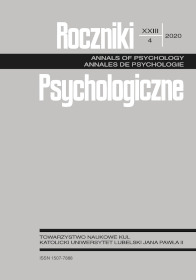Does Anger Toward God Moderate the Relationship Between Religiousness and Well-Being?
Abstract
Most of the current research has found that highly religious people have better well-being compared to people with low religiousness. However, the former group is not immune from occasionally feeling anger toward God, which has an adverse effect on well-being. The purpose of this research is to study whether anger toward God moderates the effect of religiousness on the well-being of Christian college students. The data were derived from 228 respondents (55 male) from a religious university using the Four Basic Dimensions of Religiousness (4-BDRS), the Attitude toward God Scale (ATGS-9), and the Satisfaction with Life Scale (SWLS). The results of the moderation analysis using Process version 3 demonstrated that Anger toward God significantly moderated the effect of religiousness toward well-being (b = .01, 95% Cl [.001, .023], t = 2.14, p < .05). The higher the level of anger toward God, the lesser the effect of religiousness on well-being. Therefore, it is essential for students to resolve their divine struggles. The implications and applications of this study are discussed.
References
Abu-Raiya, H., & Pargament, K. I. (2015). Religious coping among diverse religions: Commonalities and divergences. Psychology of Religion and Spirituality, 7(1), 24–33. https://doi.org/10.1037/a0037652
Abu-Raiya, H., Pargament, K. I., & Exline, J. J. (2015). Understanding and addressing religious and spiritual struggles in health care. Health and Social Work, 40(4), e126–e134. https://doi.org/10.1093/hsw/hlv055
Abu-Raiya, H., Pargament, K. I., Krause, N., & Ironson, G. (2015). Robust links between religious/spiritual struggles, psychological distress, and well-being in a national sample of American adults. American Journal of Orthopsychiatry, 85(6), 565–575.
Beck, R., & Haugen, A. D. (2013). The Christian religion: A Theological and psychological review. In K. I. Pargament (Ed.), APA handbook of psychology, religion, and spirituality: Vol. 1. Context, theory, and research (pp. 697–711). American Psychological Association. https://doi.org/10.1037/14045-039
Carter, J. L. (2019). The predictors of religious struggle among undergraduates attending evangelical institutions. Christian Higher Education, 18(4), 236–259. https://doi.org/10.1080/15363759.2018.1517619
Diener, E. E., Emmons, R. A., Larsen, R. J., & Griffin, S. (1985). The satisfaction with life scale. Journal of Personality Assessment, 49(1), 71–75.
Exline, J. J., Kamble, S., & Stauner, N. (2017). Anger toward God(s) among undergraduates in India. Religions, 8, 1–20.
Exline, J. J., Pargament, K. I., Grubbs, J. B., & Yali, A. M. (2014). The Religious and Spiritual Struggles Scale: Development and initial validation. Psychology of Religion and Spirituality, 6(3), 208–222. https://doi.org/10.1037/a0036465
Exline, J. J., Park, C. L., Smyth, J. M., & Carey, M. P. (2011). Anger toward God: Social-cognitive predictors, prevalence, and links with adjustment to bereavement and cancer. Journal of Personality and Social Psychology, 100(1), 129–148. https://doi.org/10.1037/a0021716
Exline, J. J. & Rose, E. D. (2013). Religious and spiritual struggles. In R. F. Paloutzian & C. L. Park (Eds.), Handbook of the psychology of religion and spirituality (2nd ed., pp. 379–397). Guilford Press.
Fatima, S., Sharif, S., & Khalid, I. (2018). How does religiosity enhance psychological well-being? Roles of self-efficacy and perceived social support. Psychology of Religion and Spirituality, 10(2), 119–127. https://doi.org/10.1037/rel0000168
Hood, R. W., Hill, P. C., & Spilka, B. (2018). The psychology of religion: An empirical approach (5th ed.). Guilford Press.
Koenig, H. G. (2017). Protestant Christianity and mental health: Beliefs, research, and applications. Create Space.
Koenig, H. G. (2018). Religion and mental health: Research and clinical application. Elsevier.
Regnerus, M. D. (2019). Religion and positive adolescent outcomes: A review of research and theory. Review of Religious Research, 44(4), 394–413.
Sandage, S. J., Jankowski, P., Crabtree, S. A., & Schweer, M. (2015). Attachment to God, adult attachment, and spiritual pathology: Mediator and moderator effects. Mental Health, Religion and Culture, 18(10), 795–808. https://doi.org/10.1080/13674676.2015.1090965
Saputra, A., Goei, Y. A., & Lanawati, S. (2017). Hubungan Believing dan Belonging sebagai dimensi religiusitas dengan lima dimensi well-being pada mahasiswa di Tangerang [The relationship between Believing and Belonging and well-being in college students in Tangerang]. Jurnal Psikologi Ulayat, 3(1), 7–17. https://doi.org/10.24854/jpu12016-52
Saroglou, V. (2011). Believing, bonding, behaving, and belonging: The big four religious dimensions and cultural variation. Journal of Cross-Cultural Psychology, 42(8), 1320–1340. https://doi.org/10.1177/0022022111412267
Saroglou, V. (2013). Religion personality and social behavior. Psychology Press.
Schuster, M. A., Stein, B. D., Jaycox, L. H., Collins, R. L., Marshall, G. N., Elliott, M. N., Zhou, A. J., Kanouse, D. E., Morrison, J. L., & Berry, S. H. (2001). A national survey of stress reactions after the September 11, 2001, terrorist attacks. The New England Journal of Medicine, 345(20), 1507–1512. https://doi.org/10.1056/NEJM200111153452024
Wilt, J. A., Exline, J. J., Grubbs, J. B., Park, C. L., & Pargament, K. I. (2016). God’s role in suffering: Theodicies, divine struggle, and mental health. Psychology of Religion and Spirituality, 8(4), 352–362.
Wood, B. T., Worthington, E. L., Exline, J. J., Yalie, A. M., Aten, J. D., & McMinn, M. R. (2010). Development, refinement, and psychometric properties of Attitudes toward God Scale (ATGS-9). Psychology of Religion and Spirituality, 2, 148–167.
Yali, A. M., Glazer, S., & Exline, J. J. (2019). Closeness to God, anger toward God, and seeing such anger as morally acceptable: Links to life satisfaction. Mental Health, Religion, & Culture. https://doi.org/10.1080/13674676.2019.1592135
Zarzycka, B. (2016). Prevalence and social-cognitive predictors of anger toward God in a Polish sample. International Journal for the Psychology of Religion, 26(3), 225–239. https://doi.org/10.1080/10508619.2015.1048660
Zarzycka, B., Tychmanowicz, A., & Krok, D. (2020). Religious struggle and psychological well-being: The mediating role of religious support and meaning making. Religions, 11(3), 149. https://doi.org/10.3390/rel11030149
Copyright (c) 2020 Roczniki Psychologiczne

This work is licensed under a Creative Commons Attribution-NonCommercial-NoDerivatives 4.0 International License.


